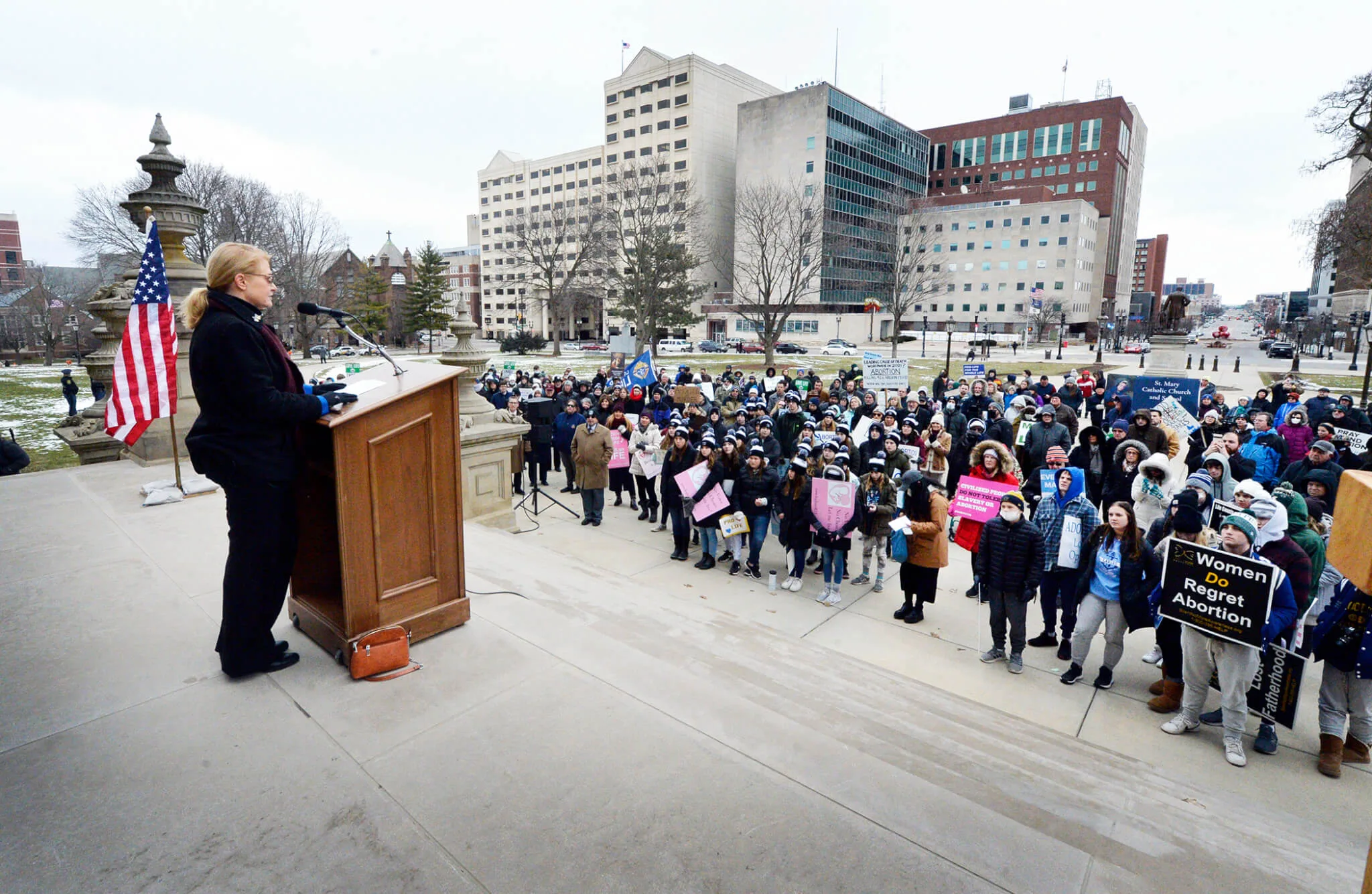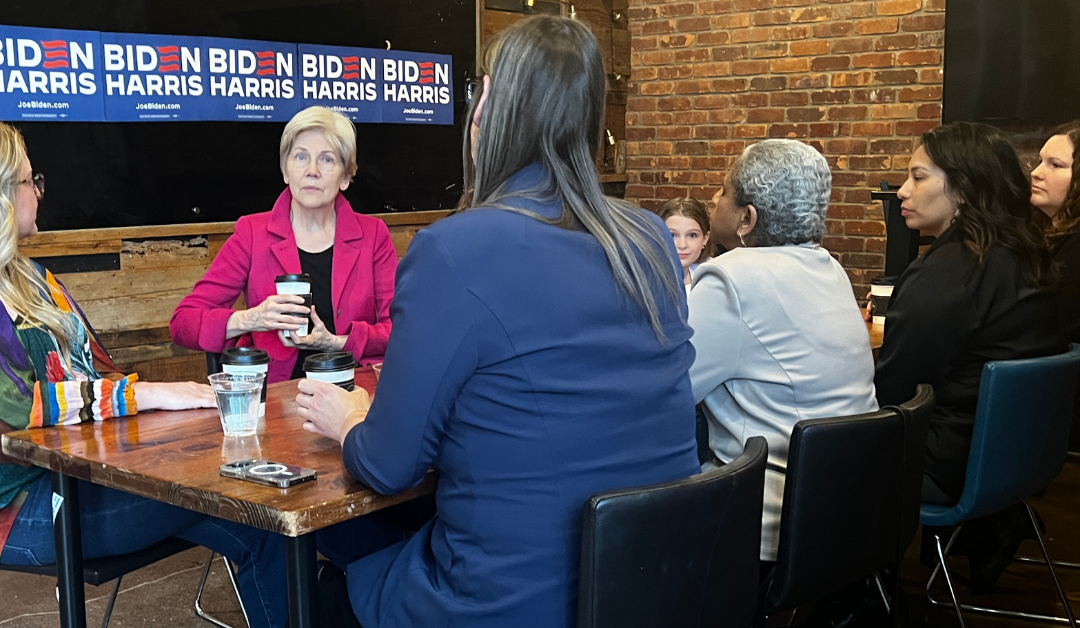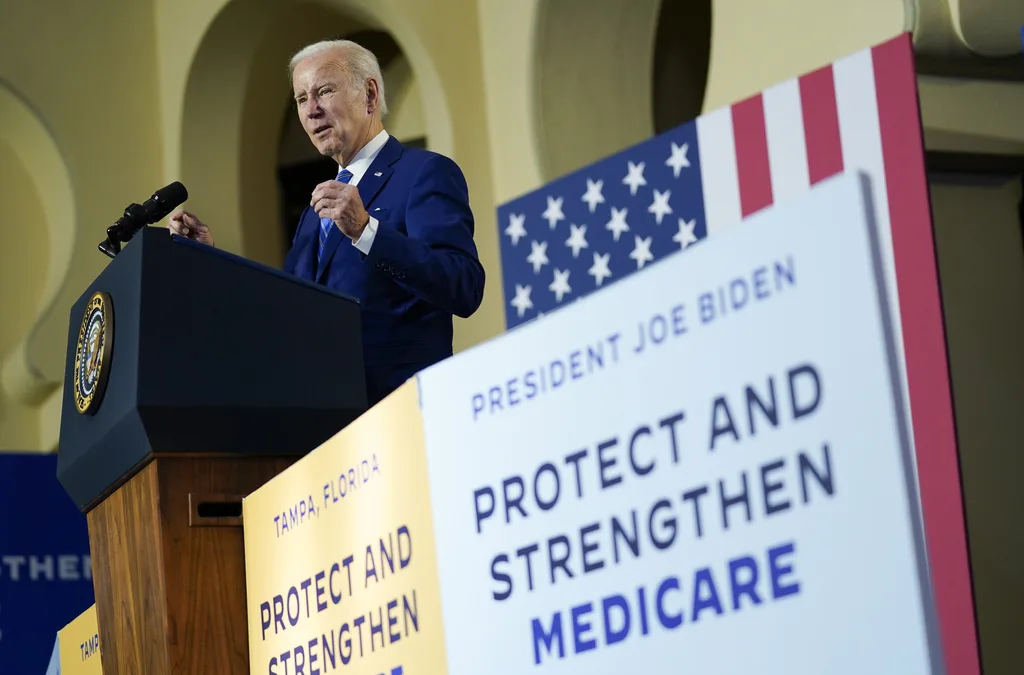
State Sen. Lana Theis speaks during the annual March for Life event at the state Capitol on Wednesday, Jan. 19, 2022. (Courtesy/Rep. Lana Theis)
These primary races could dictate where Michigan stands on a number of issues—and just seven seats could tilt legislative control away from the Republican Party in both the state House and Senate.
MICHIGAN—With less than one week until the primary election on August 2, the state’s political balance could hinge on which candidates make their way through to the general elections.
This year’s primaries are relatively unique, as there are more challengers to Republican incumbents than any time in recent memory—representing an ideological gap that threatens to splinter the party and drain candidates’ resources leading up to competitive general elections against Democrats in November.
What happens on Aug. 2 could also change the course of Michigan’s Republican Party for the foreseeable future, as the DeVos family—long the most influential Michigan family in conservative politics—and former President Donald Trump have barbs over control of the Legislature. If outsider challengers unseat enough incumbent Republicans, Trump ally Rep. Matt Maddock (R-Milford) could become the new Speaker of the House right after he was kicked out of the House Republican caucus in April.
But that plan would require Republicans to keep control of the Legislature, and that’s no sure thing. In the first year of newly drawn districts by an impartial committee, dozens of seats are up for grabs, and Democrats are forecasted to have the legislative edge in Michigan for the first time in decades.
In all, 32 of the 44 legislative Republican incumbents are facing a challenge this year. Since the Republicans control the House 57-53, three seats would need to flip to change party control. And four seats could tilt control in the Senate, where Republicans currently enjoy a 22-16 advantage.
Michiganders can vote for candidates from whichever party they choose, regardless of whether they’re a Democrat or Republican. But once they choose to vote in one party primary, they must do so down the ticket—meaning they can’t vote in a Republican primary for governor and then a Democratic primary for a Congressional seat, or vice versa. Split ticket ballots in the primary will not be counted.
Click here to view a sample ballot and find other information on where to vote in your district.
These are the primary races to watch:
State House
36th District

Location: Cass and St. Joseph counties
Republican Candidates: Steve Carra (Incumbent), Jack Coleman, Scott McGraw, Jerry Solis
Democratic Candidates: Roger Williams
Carra became one of the big players for the Michigan GOP in the state House after he tried to challenge US Rep. Fred Upton (R-St. Joseph)—both of whom have since announced they won’t be running. Carra had Trump’s backing in that race before the former president shifted his support elsewhere, to Rep. Bill Huizenga (R-Holland), leading Carra to drop out. While Carra made a move for Congress, however, other Republicans also filed for his seat, each carrying significantly different views. The race will be a bellwether for the Michigan GOP to see if Carra—who has emerged as a polarizing figure even on the far right, lacking pro-life support—survives the primaries again, as he snuck through last time with a 37% share of the vote.

63rd District
Location: St. Clair and Macomb counties
Republican Candidates: Jacky Eubanks, Jacob Skarbek, Jay DeBoyer
Democratic Candidates: Jamie Murray, Kelly Noland
Eubanks is the best-known candidate in this considerably red district, but Eubanks is also extremely divisive, having come out against contraception, and could be an interesting watch for an open primary. Earning Trump’s endorsement last winter, Eubanks went door-to-door following the 2020 election in hopes of proving that the results were rigged against Trump. She has since campaigned on investigating the election, impeaching Whitmer, and pressing charges against the governor. State police have rebuffed Eubanks’ claims of voter fraud and the other Republican candidates have been reluctant to go as far as her, setting up an interesting showdown where if Eubanks earns the nomination, Democrats could rally support from moderates and potentially flip the district blue.

64th District
Location: Sanilac and St. Clair counties
Republican Candidates: Andrew Beeler (Incumbent), Gary Eisen (Incumbent), John Mahaney
Democratic Candidates: Charles Howell
This race is a relatively rare case of two state House incumbents from the same party pitted against each other, vying for the same seat where the Republican primary victor will more than likely go all the way in November. Beeler has the backing of the Michigan Farm Bureau, and moderate conservative organizations have previously championed him as an up-and-coming figure in the Republican Party. Eisen, meanwhile, supported a group that sought to disrupt Michigan’s Electoral College, suggesting that they may resort to violence, which had House leadership strip him of committee seats. Mahaney is a long shot: He has twice lost a bid for House, including a loss to Eisen in 2022.

68th District
Location: Genesee and Oakland counties
Republican Candidates: David Martin (Incumbent), Lynne Freiberger, Vern Miller, Kristen Swanson
Democratic Candidates: Amie Carter, Raymond Freiberger, Cheri Hardmon
Even aside from a husband and wife running on opposite sides of the aisle, this primary contains plenty of fireworks. Martin is a strong incumbent for the Republican side, but the district looks very different after redistricting, and Swanson is primarying him as part of the “MAGA movement.” For the Democrats, Hardmon is a recognizable face in the area, as she is a weekend anchor for WJRT-TV and is backed by the Michigan AFL-CIO; she stands a real chance if Martin goes down.

79th District
Location: Barry, Allegan, and Kent counties
Republican Candidates: Angela Rigas, Ryan Gallogly, Jeremiah Keeler
Democratic Candidates: Kimberly Kennedy-Barrington
Anything can happen in this Republican primary, which pits Angela Rigas, a Trump-endorsed small business owner from Caledonia, against two formidable candidates. Rigas has been around politics as an activist in the Republican primary, running in a primary in 2014, and is proud to have attended the Jan. 6 insurrection, she said. Both Gallogly and Keeler are more traditional, well-liked candidates and have rallied local support—like Gallogly with an endorsement from the Associated Builders and Contractors of Michigan and Keeler with the Grand Rapids Chamber of Commerce.

84th District
Location: Kent County
Republican Candidates: Mike Milanowski Jr., Robert Regan, Justin Noordhoek, John Wetzel
Democratic Candidates: Carol Glanville (Incumbent)
The cards need to be shuffled in this Republican primary. Regan fumbled a special election bid in May to Glanville when a number of Regan’s sexist and racist comments turned off voters in an overwhelmingly Republican area. Now, the district is remade in a way that already helps Democrats, and Glanville gets the benefit of incumbency and a Republican primary that resembles the one that produced Regan. Unless Republicans can pull off something special, Glanville is likely to remain in office, securing a key seat in Democrats’ fight for the House following redistricting.

88th District
Location: Muskegon and Ottawa counties
Republican Candidates: Greg VanWoerkom (Incumbent), Mick Bricker
Democratic Candidates: Jeffrey Noel, Christine Baker
VanWoerkom is extremely well-liked within the Republican Party and is part of the Michigan GOP bloodline, with his father having served in the state Senate and VanWoerkom having worked in the US House as an aide to Huizenga. But his challenger, Mick Bricker, has the backing of Trump and Maddock, Trump’s main ally within the Michigan House, and he’s set to use VanWoerkom’s history in Lansing against the sitting representative. The winner of the Republican primary will likely take this solidly red seat, even as Noel and Baker garner significant support from Grand Haven. The primary will be a test of Trump’s influence in Michigan.

103rd District
Location: Benzie, Leelanau and Grand Traverse counties
Republican Candidates: Jack O’Malley (Incumbent), Heather Cerone
Democratic Candidates: Betsy Coffia, Michael Brodsky
In 2020, this district went for President Joe Biden and Republican Senate candidate John James simultaneously, meaning it’s either party’s for the taking. A radio host and incumbent, O’Malley is popular and personable with connections in the area, but Cerone is backed by prominent election conspiracists. For the Democrats, Coffia is an established candidate who has yet to get to the House despite multiple attempts, while Brodsky serves on the Traverse City Downtown Development Authority Board of Directors and once interned for US Senator Gary Peters (D-MI), who was then in the House of Representatives.
INVESTIGATION: The Will of the 8%: Michigan’s Legislative Loophole
State Senate

4th District
Location: Wayne County
Republican Candidates: James Chapman, Michael Frazier, James Houston, Beth Socia
Democratic Candidates: Darrin Camilleri
The only primary in the 4th District is on the Republican side, and the party will need a strong candidate to unseat Camilleri, who’s a popular state representative. That’s a big question mark. Houston is a relative unknown, but used to be a Congressional intern. Frazier lost handily to Camilleri in 2018, and Chapman, who’s ran and lost multiple times, brought a naked doll in a noose to a 2020 protest of the governor. This is a must-win for Democrats, even in a district that’s shaped well for Republicans, and a fringe Republican could cement Camilleri’s seat.

6th District
Location: Oakland and Wayne counties
Republican Candidates: Ken Crider
Democratic Candidates: Mary Cavanagh, Vicki Barnett, Darryl Brown
This will be a Democratic district, so the primary is the real competition. On paper, Barnett and Cavanagh are neck and neck, and the two candidates have similarly middle-left policies and approaches to the campaigns. The mayor of Farmington Hills, Barnett will likely do better in the suburbs, while Cavanagh should take the slice of Detroit included in this district—though Cavanagh will need to overcome a recent drunk driving charge.

17th District
Location: Branch, St. Joseph, Cass, Calhoun and Berrien counties
Republican Candidates: Kim LaSata (Incumbent), Jonathan Lindsey
Democratic Candidates: Scott Rex Starr
Starr is the lone Democrat in a solidly Republican district, so the real race is on Aug. 2 between LaSata and Lindsey. A sitting state senator, LaSata lost some of north Berrien County to redistricting, but she still boasts five years of experience serving the area as an elected representative and has worked to support law enforcement, expand broadband access, and cut taxes. In contrast to some of the other Trump-endorsed candidates, Lindsey has a background inside of and adjacent to politics, having graduated from Yale with a political science degree and served in the army, and he’s well-funded from a variety of sources, including himself. More similar to other Trump-endorsed candidates are Lindsey’s priorities, which include rolling back government overreach and strengthening election security.

22nd District
Location: Livingston, Ingham, Shiawassee, Genesee, and Oakland counties
Republican Candidates: Lana Theis (Incumbent), Mike Detmer
Democratic Candidates: Jordan Genso
In this Republican-leaning district, Theis ticks all the boxes except for one: an endorsement from Trump. That belongs to Detmer, her challenger, since Trump propped up the one-time Congressional hopeful after Theis’ signed a Michigan Senate Oversight Committee report that debunked claims that Trump was cheated during the 2020 election. This district sets up a primetime showdown between Trump and his former Secretary of Education Betsy DeVos, who has bankrolled Theis as a core supporter of voucher programs and launched attack ads against Detmer. The race more largely could indicate who controls the Michigan GOP.
35th District

Location: Bay, Midland, and Saginaw counties
Republican Candidates: Annette Glenn, Tim Kelly, Martin Blank, Christian Velasquez
Democratic Candidates: Kristen McDonald Rivet
In a district that could swing either way, Rivet awaits whichever Republican makes it out of a hotly contested primary. A state representative from Midland, Glenn has a good grip on the region, though she and Kelly, a former state representative, could take votes away from one another as populists candidates each with a dose of controversy—most notably when Kelly made racist posts about Muslims. This primary is one where candidates who skew too far right may lose voters in a general election predicted to be a nail-biter, which could give the region its first Democratic senator in more than a decade.

37th District
Location: Northern Michigan
Republican Candidates: Triston Cole, John Damoose, William Hindle, George Ranville
Democratic Candidates: Barbara Conley, Jimmy Schmidt, Randy Bishop
In this race, there’s only one real Democrat: Barbara Conley. County organizers have suggested that far-right candidates Jimmy Schmidt and Randy Bishop are running as Democrats try to steal votes from Conley to set up a conservative-versus-conservative general election, though Democrats likely stand no chance in this district to begin with. Meanwhile, on the Republican side, there’s plenty to watch as Cole and Damoose have both served as representatives and belong to the conspiracy wing of the GOP, and Ranville is a favorite among grassroots organizers. If seven candidates wasn’t enough to keep track of, there are other oddities in this bizarre race too, including an apparent plot to bribe Hindle, blatant racism, and an already messy primary.
Politics

‘You are not safe’: Elizabeth Warren warns Michigan women ahead of presidential election
Abortion is protected under the state Constitution in Michigan. But Republican-led efforts to enact a nationwide abortion ban could still jeopardize...

Biden cancels student loan debt for 8,750 more Michiganders
The Biden administration on Friday announced its cancellation of an additional $7.4 billion in student debt for 277,000 borrowers, including 8,750...

The Republican war on Medicare raises the stakes in 2024
Nearly 2.2 million Michiganders rely on Medicare benefits—benefits they spent decades paying into, with the promise that the program would be there...
Local News

12 ways to celebrate 420 in Michigan in 2024
Michiganders love weed—and when it comes to celebrating the biggest stoner holiday of the year, they don’t hold back. MICHIGAN—With more than $3...

You can visit these 1,000-year-old Native American carvings in Michigan’s Thumb
Along a backroad just south of Bad Axe, a small dirt parking lot and unassuming sign are the only hints of something bigger—and deeply significant...





